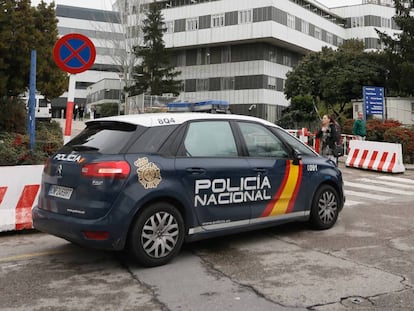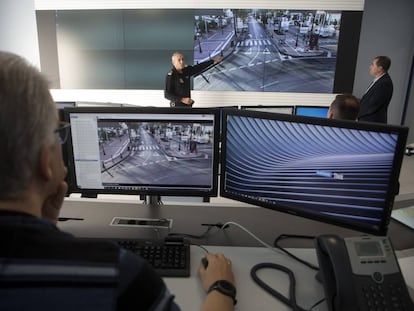Costa del Sol hit by new wave of gangland-style killings
Authorities say the recent murders are connected to score settling between rival drug gangs, but there are concerns that the ongoing violence could claim civilian lives
Last Tuesday, a 60-year-old French man was dining at the Da Bruno restaurant in the southern Spanish city of Marbella. Like always, the place was full. While he was eating, two hitmen parked a rented Renault Megane outside the door to the restaurant. They waited patiently. A little after 8pm, the Frenchman came out, and was shot six times in cold blood as he walked to his car. “Boom, boom. The shots were heard perfectly,” says a worker who was in the area at the time.
This is not new. This has been happening for years
Police officer
The day of the murder was chosen intentionally: Tuesday is when the security guard at the parking lot has the day off. The hitmen wore masks and fled to the AP-7 highway, breaking the entry barriers as they passed. They then torched the car on a remote road and disappeared.
This is just one murder in a wave of killings to hit the Costa del Sol. On Wednesday, firefighters recovered the body of a 20-year-old Slovenian man who had been shot multiple times and left on a 10-meter-tall cliff, according to local news site Marbella Hoy.
Since September, six people have been shot in the areas surrounding Marbella, four in the last month. None of the cases have been solved. It is almost taboo for police to talk about the issue. Authorities have made few public statements about the violent deaths – which include one victim who was riddled with 14 bullets – except to say that there is no relationship between them. “They are unconnected events,” Enrique Lamelas, the National Police commissioner in Marbella, said this week. The central government’s delegate in Andalusia, Lucrecio Fernández, maintained the same line of argument, calling the murder on Tuesday a “settling of scores.”
The use of explosives and military weapons such as Kalashnikov assault rifles is no longer the exception
“This is not new. This has been happening for years,” says a police officer. But what is new is the mounting number of victims in such a short time, which has increased the feeling of impunity and raised concerns that there will be more murders in the future. The officers, in private, are crossing their fingers. “Too little happens for the number of dangerous criminals that are on the Costa del Sol,” says an experienced officer.
Meanwhile, the widow of the Frenchman is calling for answers. The authorities have responded that the man’s death is connected with the growing number of drug-trafficking gangs. “There is an increasing number [of gangs], from increasingly diverse nationalities,” says the veteran officer. With more than 100 groups, business has to be divided up between them. Police pressure is also taking a toll on many of the gangs. This had led to more drugs being stolen between the criminal groups, which creates a vicious circle of payback and score settling. The use of explosives and military weapons such as Kalashnikov assault rifles is no longer the exception. Nor is torture or murder in broad daylight.
The mayor of Marbella, Ángeles Muñoz from the conservative Popular Party (PP), promised on Thursday to “address” the crime rate in the area as a “state issue,” and asked for police reinforcements.
You have to trust that the hitmen are professionals and know exactly who to kill
British visitor Bill
Drug-trafficking organizations have everything they need on the Costa del Sol. The gang leaders have settled comfortably in the housing developments scattered across the mountain and the city, where they can enjoy their fortune in anonymity. Everything is close at hand: a country that produces hashish, Morocco, somewhere to bring in the cocaine, Algeciras Bay, and a place to launder the money, Gibraltar, the British Overseas Territory in the south of Spain. It is also home to professionals who handle all stages of the trafficking business – workers to offload the drug shipments, guards to watch over the storage houses and gangs that can distribute the product across Europe. “They act like a logistics business,” says the Civil Guard’s Organized Crime and Narcotics Team.
In the Riviera del Sol housing development, between Mijas and Marbella, a bouquet of red and white flowers is tied to a street light in front of a house at No. 5 Orfebres street. Outside the house, there are still bloodstains from the British man who was shot dead on November 22. He had driven home in his Audi around midday, and was shot five times from another car before he could get out. The residents of Riviera del Sol prefer not to speak about the crime. “It’s better to be discreet,” says one woman as she throws out her trash.
“They always kill each other”
A few days ago, the spokesperson for Marbella City Hall, Féliz Romero from the PP, said that the feeling in the city is of “maximum security,” claiming the murders had gained “more visibility” because it is a popular tourist destination. In a bar in the Las Chapas neighborhood, the patrons discuss the recent murders. “We are not afraid,” says one. “They always kill each other,” adds another. But the patrons, who prefer not to give their names, are also worried that the next victim will be an innocent bystander. The last time that happened was in 2004, when a six-year-old boy and a 36-year-old man were killed, after two hooded individuals fired 50 shots to kill a rival, who escaped.
“Look at what we’ve come to. Now you have to trust that the hitmen are professionals and know exactly who to kill,” says Bill, a Briton who spends six months of the year in a caravan in a camping spot at Cabopino beach with his wife. He did not hear the shots on Tuesday. Like most of the campers, he was at a pub quiz in a bar at the time. Nothing was heard there. Despite the bullets, life goes on in Marbella.
English version by Melissa Kitson.
Tu suscripción se está usando en otro dispositivo
¿Quieres añadir otro usuario a tu suscripción?
Si continúas leyendo en este dispositivo, no se podrá leer en el otro.
FlechaTu suscripción se está usando en otro dispositivo y solo puedes acceder a EL PAÍS desde un dispositivo a la vez.
Si quieres compartir tu cuenta, cambia tu suscripción a la modalidad Premium, así podrás añadir otro usuario. Cada uno accederá con su propia cuenta de email, lo que os permitirá personalizar vuestra experiencia en EL PAÍS.
En el caso de no saber quién está usando tu cuenta, te recomendamos cambiar tu contraseña aquí.
Si decides continuar compartiendo tu cuenta, este mensaje se mostrará en tu dispositivo y en el de la otra persona que está usando tu cuenta de forma indefinida, afectando a tu experiencia de lectura. Puedes consultar aquí los términos y condiciones de la suscripción digital.










































